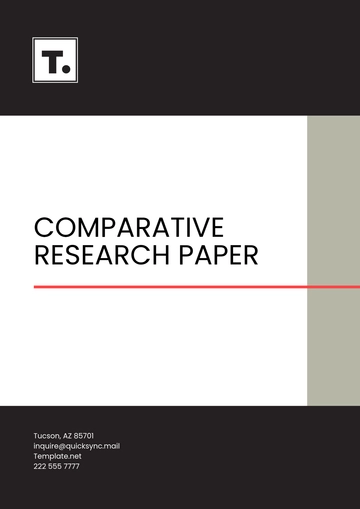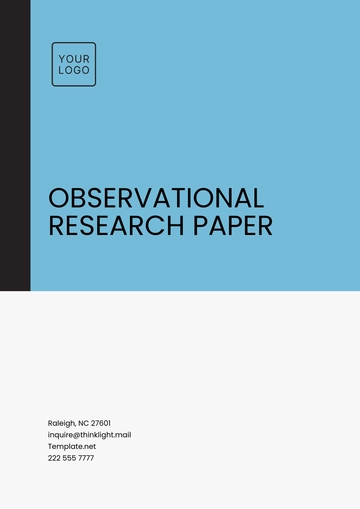Free Randomization Techniques Research Design

Prepared by: [YOUR NAME]
Date: [DATE]
Randomization Techniques in Research Design are a methodological framework used to assign participants to different groups in a study randomly. This approach ensures that each participant has an equal chance of being assigned to any group, which helps control for biases and ensures the validity and reliability of the study’s results.
I. Introduction
Randomization is a crucial element in the design of scientific and clinical studies. It ensures that the groups being compared are similar in all respects except for the intervention being tested. This article explores different randomization techniques, the importance of randomization, and how it contributes to the reliability and validity of research findings.
II. Types of Randomization Techniques
Various randomization techniques can be employed depending on the study's requirements and constraints. The main types of randomization techniques include:
Simple Randomization: Each participant is assigned to a group purely by chance. This method can be implemented using random number tables, computer-generated random numbers, or drawing lots.
Block Randomization: Participants are divided into blocks, and within each block, individuals are randomly assigned to different treatment groups. This ensures a balance in the number of participants among groups.
Stratified Randomization: The population is divided into subgroups (strata) based on certain characteristics, and then randomization is performed within each stratum. This approach helps to control for confounding variables.
Cluster Randomization: Instead of individuals, groups or clusters of participants are randomly assigned to different treatment arms. This is often used in educational or community-based studies.
Minimization: A dynamic randomization method that adjusts the probability of assignment based on the existing group composition to ensure balance regarding specific covariates.
III. Advantages of Randomization
Elimination of Selection Bias: Randomization ensures that participants are assigned to groups without any selection bias, which could otherwise influence the study outcomes.
Control of Confounding Variables: By randomly assigning participants to different groups, confounding variables are evenly distributed, thus minimizing their impact on the study results.
Enhancement of Validity: Randomization enhances the internal validity of the study by ensuring that any observed effects are due solely to the intervention rather than extraneous variables.
Facilitation of Blinding: Random allocation helps facilitate blinding, where participants and researchers are unaware of group assignments, further reducing bias.
IV. Challenges and Considerations
While randomization is a powerful tool in ensuring the credibility of research, several challenges and considerations must be taken into account:
Ethical Concerns: Ensuring ethical standards while randomly assigning participants, especially in clinical trials, is paramount.
Implementation Complexity: Some randomization methods may be complex to implement, particularly in large or multi-site studies.
Need for Adequate Sample Size: For randomization to be effective, a sufficiently large sample size is necessary to ensure proper distribution of confounding factors.
V. Applications in Clinical Trials
Randomization is widely used in clinical trials to compare the effectiveness and safety of new treatments or interventions. Some key applications include:
Pharmaceutical Trials: Testing new drug therapies and ensuring that observed effects are due to the drug itself and no other variables.
Surgical Interventions: Comparing surgical techniques by randomly assigning patients to different surgical methods to evaluate which is more effective or safer.
Behavioral Studies: Assessing the impact of behavioral interventions, like lifestyle changes or counseling, on health outcomes.
VI. Conclusion
Randomization techniques are fundamental in ensuring the validity and reliability of research findings. By minimizing biases and controlling for confounding variables, randomization enhances the internal validity of a study. Researchers must carefully choose the appropriate randomization technique based on the study design, objectives, and practical constraints.
VII. References
Altman, D. G., & Bland, J. M. (2050). Statistics notes: treatment allocation in controlled trials: why randomize? BMJ, 318(7192), 1209. https://doi.org/10.1136/bmj.318.7192.1209
Suresh, K. P. (2051). An overview of randomization techniques: An unbiased assessment of outcome in clinical research. Journal of Human Reproductive Sciences, 4(1), 8. https://doi.org/10.4103/0974-1208.82352
Schulz, K. F., & Grimes, D. A. (2052). Generation of allocation sequences in randomized trials: chance, not choice. The Lancet, 359(9305), 515-519. https://doi.org/10.1016/S0140-6736(02)07683-3
- 100% Customizable, free editor
- Access 1 Million+ Templates, photo’s & graphics
- Download or share as a template
- Click and replace photos, graphics, text, backgrounds
- Resize, crop, AI write & more
- Access advanced editor
Discover the Randomization Techniques Research Design Template on Template.net—your go-to for structured research. This editable and customizable template is fully adaptable to fit your needs, and it’s easily editable in our AI Editor Tool. Perfect for streamlining your research design process and ensuring precise randomization techniques. Enhance your research with ease!





























